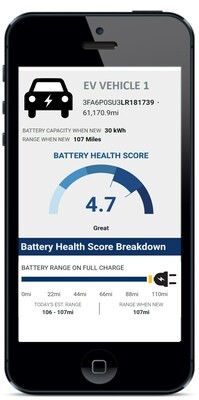Trust matters when it comes to car buying in both wholesale and retail. To drive confidence and transparency in the new and used EV market and help optimize battery first life, Cox Automotive on Jan. 24 announced the next phase of its pioneering approach to EV Battery Health scoring and diagnostics.
The company will set the foundation for the industry standard in EV battery inspection and valuation with its VIN-specific battery grading system unlike any other solution available today. The pilot of Cox Automotive's EV Battery Health mobile app and Bluetooth® dongle will launch at 10 Manheim locations across the U.S.---Pennsylvania, Southern California, San Francisco, Riverside, Nevada, Dallas, Phoenix, Seattle, Nashville and Portland.
"We take pride in our EV battery diagnostic tool and grading system, and the benefits it brings the secondary vehicle market as an independent third-party standard for EV battery health are unmatched in the industry," said Lea Malloy, AVP of EV battery solutions, Cox Automotive Mobility. "The battery pack is the single most expensive part of an EV, accounting for 30% to 40% of the total cost of the vehicle. With the anticipated influx of used EVs entering the market, our battery health score will help create confidence and transparency at the point of sale."
Providing transparent and accurate vehicle valuations is nothing new for Cox Automotive. Kelley Blue Book has equipped owners and buyers with trusted new car pricing and used retail values for nearly 100 years, and the Manheim Market Report, fueled by millions of transactions in the world's largest wholesale automotive marketplace each year, continues to be the premier indicator of wholesale values.
With more than 28 million used battery electric and plug-in hybrid vehicles scheduled to infiltrate the U.S. car parc by 2030, Cox Automotive's leadership will power this electric marketplace.
VIN-Specific EV Battery Health Score---More than a Number
Unlike the grading systems of other EV battery diagnostic tools, which provide a general battery estimate based on make and model, Cox Automotive's mobile Battery Health tool directly evaluates each car and provides VIN-specific information, vital in capturing accurate information around the health of the battery.
The easy-to-use tool measures current battery condition, historical battery data (times, temperatures and types of charges) and performance, which the company's patented health algorithm then uses to produce a VIN-specific battery score ranging from one to five. That score, along with information on the battery's current estimated range will be included in the EV Battery Health Report.
"To meet the future growth of EVs at our Manheim locations, we have been investing in an infrastructure to service and support our clients' future EV battery needs," said Grace Huang, president of Cox Automotive Inventory Solutions. "Creating a trusted battery health score supports our efforts to build an industry standard for battery health, while delivering the type of vehicle information clients require."
Cox Automotive's Battery Health score addresses three of the top five barriers to EV adoption among non-considerers, including consumers' concerns about low mileage range (40%), the cost of battery replacements (35%) and batteries not holding their charge (30%). Furthermore, most EV considerers (81%) would consider a used EV at 90%---or 10% degradation---capacity with a battery health certificate.
The battery pack is the single most expensive part of an EV, accounting for 30% to 40% of the total cost of the vehicle. This makes providing a VIN-specific battery health score a vital component to providing accurate used vehicle valuations. Cox Automotive's current data sample of battery health metrics collected from Manheim, which includes more than 1,200 vehicle tests, confirmed the following:
- Most, but not all, EV batteries are built to last. The average used battery health score reported was high, with an average score of 4.6. However, as batteries age, the number of outliers increase, highlighting the importance of evaluating each individual vehicle.
- The higher the battery health score, the higher the transaction price. The average vehicle sales price increased by 1% to 4% (or 2.4% on average) when earning a higher battery health score.
- Mileage is less relevant with EVs. There was an inconsistent correlation between a battery health score and mileage on the vehicle's odometer.
Cox Automotive EV Battery Solutions
Cox Automotive is committed to being the world's best battery health innovator and end-to-end EV battery lifecycle services provider, offering efficient and sustainable solutions that enable the extension of battery first lives and end-of-life reuse and pre-treatment recycling.
Source: Cox Automotive













